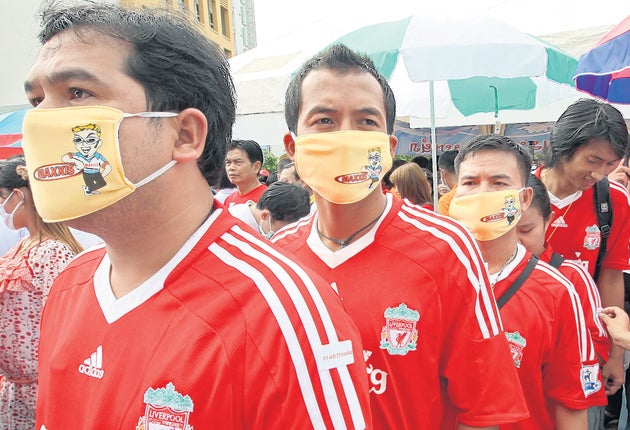Glaxo unmasked: drug firm to make £1bn from swine flu

Your support helps us to tell the story
From reproductive rights to climate change to Big Tech, The Independent is on the ground when the story is developing. Whether it's investigating the financials of Elon Musk's pro-Trump PAC or producing our latest documentary, 'The A Word', which shines a light on the American women fighting for reproductive rights, we know how important it is to parse out the facts from the messaging.
At such a critical moment in US history, we need reporters on the ground. Your donation allows us to keep sending journalists to speak to both sides of the story.
The Independent is trusted by Americans across the entire political spectrum. And unlike many other quality news outlets, we choose not to lock Americans out of our reporting and analysis with paywalls. We believe quality journalism should be available to everyone, paid for by those who can afford it.
Your support makes all the difference.Britain's largest pharmaceuticals company could make up to £1bn from sales of its swine flu vaccine by the end of the year, industry analysts said yesterday as the first trials of the drug began in Australia.
GlaxoSmithKline (GSK) is to sell the vaccine for up to £6 a dose in Western countries, and the first supplies are due to arrive in Britain in September.
Andrew Witty, GSK's chief executive, refused to apologise for the boost in earnings, pointing out that GSK had invested more than $2.5bn (£1.5bn) in its vaccine development programme over the past few years.
"Swine flu is going to be positive for the performance [of the company], but only because we have put ourselves in a position to do it," he added. "And we have done that by taking very significant risks over a long time, diverting a huge amount of resources to it and doing the research that nobody else has done, so I'm not going to apologise for the fact that the company is going to make a return."
GSK is in talks with more than 50 governments and has already agreed to produce 195 million doses of A(H1N1) vaccine. Mr Witty said this was well below what it eventually expected to ship, given that countries were at different stages of preparedness.
However, GSK will earn further millions by selling its swine flu treatment Relenza – production of which is to be tripled to 190 million doses a year by the end of 2009. It has also received approval for a new disposable antiviral face mask which worked against all previous strains of bird and swine flu. The mask has yet to be tested against the current swine flu strain, although Mr Witty said he was confident it would be effective.
Simon Mather, an analyst at WestLB said GSK would generate sales of at least £500m by January but that could rise to £1bn as it already had 195 million vaccine doses under contract.
GSK will be charge Western governments €7 per dose and has agreed to negotiate lower amounts with the governments of developing nations. It has also agreed to give the World Health Organisation 50 million doses for free.
The British Government has ordered 132 million doses of vaccine from GSK and its rival Baxter but has not said how the order is split between the two companies.
The 31st British death from swine flu was confirmed in the West Midlands yesterday. The man's death, at Walsall Manor Hospital on Tuesday night, is being investigated by the NHS.
Figures due out today will show a continuing rise in the number of people with flu-like illness consulting their GPs over the past week. The data from the Royal College of GPs' surveillance centre in Birmingham will be released along with latest figures on hospitalisations and deaths. The virus is targeting children who have a higher rate of complications, raising concerns about the NHS's capacity to deal with them. The hospitalisation rate is four times higher among the under-fives than among adults.
Roddy O'Donnell, a consultant at Addenbrooke's Hospital in Cambridge, said NHS trusts were racing to try to increase capacity at the country's 25 paediatric intensive care units but fewer than half had done so.
"Initially, it hadn't been anticipated how much this virus might affect children," he added. "There has been a scramble to boost provision round the country. There hasn't been as much time as one might wish."
Join our commenting forum
Join thought-provoking conversations, follow other Independent readers and see their replies
Comments